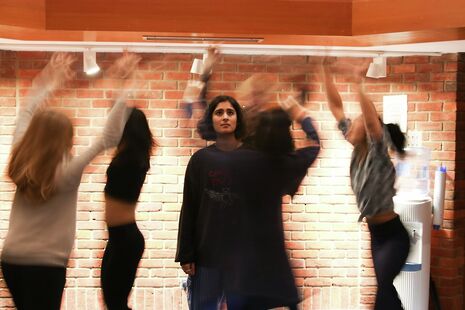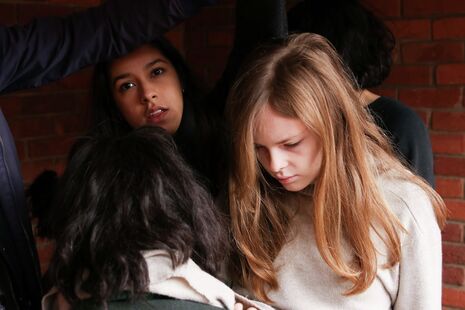Wander preview: ‘relevant, important – and even grand’
Claire Takami-Siljedahl and Faye Guy bring to the ADC a production about telling stories that reminds us of the simple beauty in a fairytale about self-discovery and coexistence

Wander tells a story about telling stories. In this fairy tale, Faryn’s life revolves around the stories of others, until one day she sets off on a journey, which might let her find her own narrative. But until then, she has yet to encounter numerous droll fellows who are keen to share their own tales. Three layers of stories so far. These are, though, not the only ones.
Wander is the first play Co-Directors Claire Takami-Siljedahl and Faye Guy have written together. Both intensely immersed in the Cambridge theatrical scene, one of their main objectives is to demonstrate that pieces of new writing can engage the audience without necessarily being minimalist – and be successful. Instead of over-symbolised, big, abstract notions, they aim to show that joy, harmony and the nostalgia which overcomes us when touched by the long-forgotten brightness of childhood enthusiasm can be relevant, important – and even grand.
Being English finalists, Wander is an opportunity for Takami-Siljedahl and Guy to employ their wisdom and insight from both their theatrical and academic experiences in Cambridge. This comes across when the two Co-Directors tell me that what they were first sure about were images and atmospheres. They imagined snow; they recalled the fanfares in Hogan’s Peter Pan movie; they had a world in mind with only a bit of elevation: escapism in a good sense. Little wonder that the piece operates with a rich, never-before-seen set design and physical theatre.
The success of such a recipe depends on two ingredients: careful, sensitive characterisation and keeping the right degree of resonance with reality. In the case of Wander, the selection of the cast already represents the focus on these two aspects. After having applied for a range of roles which specifically included BME and LGBT+ ones (a decision made by the directors to ensure the diversity of the cast), the cast participated in workshops that involved a lot of physical theatre. It is clear that the cast consists of talented people with strong and refreshingly different personalities, who were keen on working together.

This is important, as the actors had space to form their characters, and to work on their interactions. In fact, most of the characters are named after their actors. The work was based on a lot of theatrical practices which let the members of the company get close to and comfortable with each other, as well as have enough time and opportunity to elaborate on the stories and personalities of their characters. Each of the characters contributes to the immense tread of tales. This adds to the directors’ vision which was already built on vast sources ranging from Japanese to Scandinavian to Cornish fables.
Surely, this is how amateur theatre should be. This kind of process takes immense, often indirect effort, which all too often seems like a waste of time, judged to be unaffordable in a purely performance-driven milieu. Wander is an example of how false this judgement is. The way in which it was rehearsed not only adds quality, it adds yet another layer of story.
I greatly enjoyed seeing behind the scenes of this rehearsal process. Takami-Siljedahl and Guy have created a very particular space in practising ensemble work in complete harmony. A space where they are reading out the scene they had just seen for the first time in the most self-evident way possible, as to how it should be played. It is almost impossible to tell when the scene ends and when the actors are no longer in character because the scene is written in a beautifully fluent way. The impressive aspect of all this is that this sphere is being slightly elevated from reality at all time. One forgets that these figures around them are flesh and blood Cambridge students and cannot but smile. And this is merely a rehearsal.
Wander is a positive campaign. It shows how the message of self-discovery and coexistence with others can be communicated without losing itself in complicated and obscure solutions. It shows that a fairy-tale can be smart and (also intellectually) layered. Not that, considering its vast collection of instances in literature, anyone should question it. But from time to time, we somehow tend to forget this truth.
So, dear reader, I kindly invite you to take part in the story yourself by buying your ticket to watch this heart-warming, smart and ambitious piece.
Wander is on at the ADC Theatre, 20-24 February
 Features / Should I stay or should I go? Cambridge students and alumni reflect on how their memories stay with them15 December 2025
Features / Should I stay or should I go? Cambridge students and alumni reflect on how their memories stay with them15 December 2025 News / Cambridge study finds students learn better with notes than AI13 December 2025
News / Cambridge study finds students learn better with notes than AI13 December 2025 Comment / The magic of an eight-week term15 December 2025
Comment / The magic of an eight-week term15 December 2025 News / News In Brief: Michaelmas marriages, monogamous mammals, and messaging manipulation15 December 2025
News / News In Brief: Michaelmas marriages, monogamous mammals, and messaging manipulation15 December 2025 News / Uni Scout and Guide Club affirms trans inclusion 12 December 2025
News / Uni Scout and Guide Club affirms trans inclusion 12 December 2025









